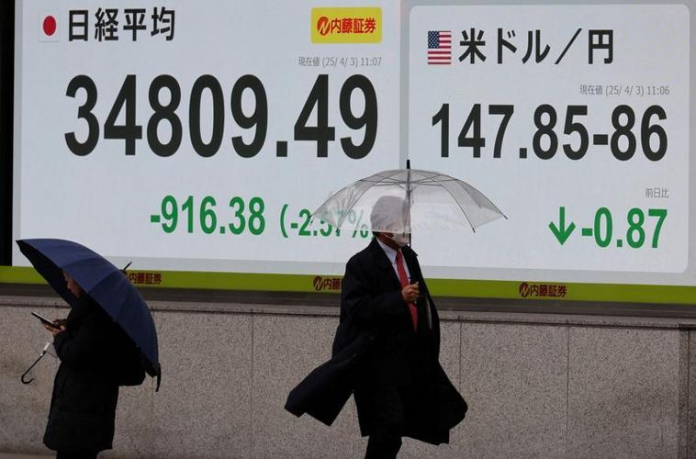Japanese banking shares led a deepening global market rout on Friday, as investors fled risk assets following US President Donald Trump’s imposition of sweeping tariffs, sparking fears of a worldwide recession, according to Reuters.
The Nikkei index plummeted 9% this week—its steepest weekly decline in over five years—while US Treasury yields tumbled and gold prices hovered near record highs.
Japan’s banking index plunged 11% at one stage, triggering circuit breakers, as traders bet the Bank of Japan (BOJ) could delay interest rate hikes amid growing economic uncertainty. The selloff mirrored sharp losses on Wall Street, where Citigroup and Bank of America nosedived 12% and 11% respectively, with Morgan Stanley and Goldman Sachs each shedding over 9%.
The tariff shockwave ignited a stampede into government bonds, gold, and the yen. US 10-year Treasury yields slid below 4% for the first time since October, while Japanese government bond (JGB) yields posted their largest weekly drop in three decades. Spot gold held near an all-time peak of $3,101.35 per ounce, poised for a fifth consecutive weekly gain.
Equity markets haemorrhaged value globally, with S&P 500 firms losing $2.4 trillion in a single session, the worst since March 2020’s pandemic-driven collapse. US and European futures signalled further declines, while oil prices extended losses as recession fears overshadowed supply dynamics.
Markets now price in over 100 basis points of Federal Reserve rate cuts this year, though sticky core inflation may limit the scope for easing.
All eyes turn to Fed Chair Jerome Powell’s speech later on Friday for clues on the US economic outlook. Meanwhile, the yen strengthened to ¥146.03 per dollar, whereas the euro climbed to $1.1065 amid broad dollar weakness.
